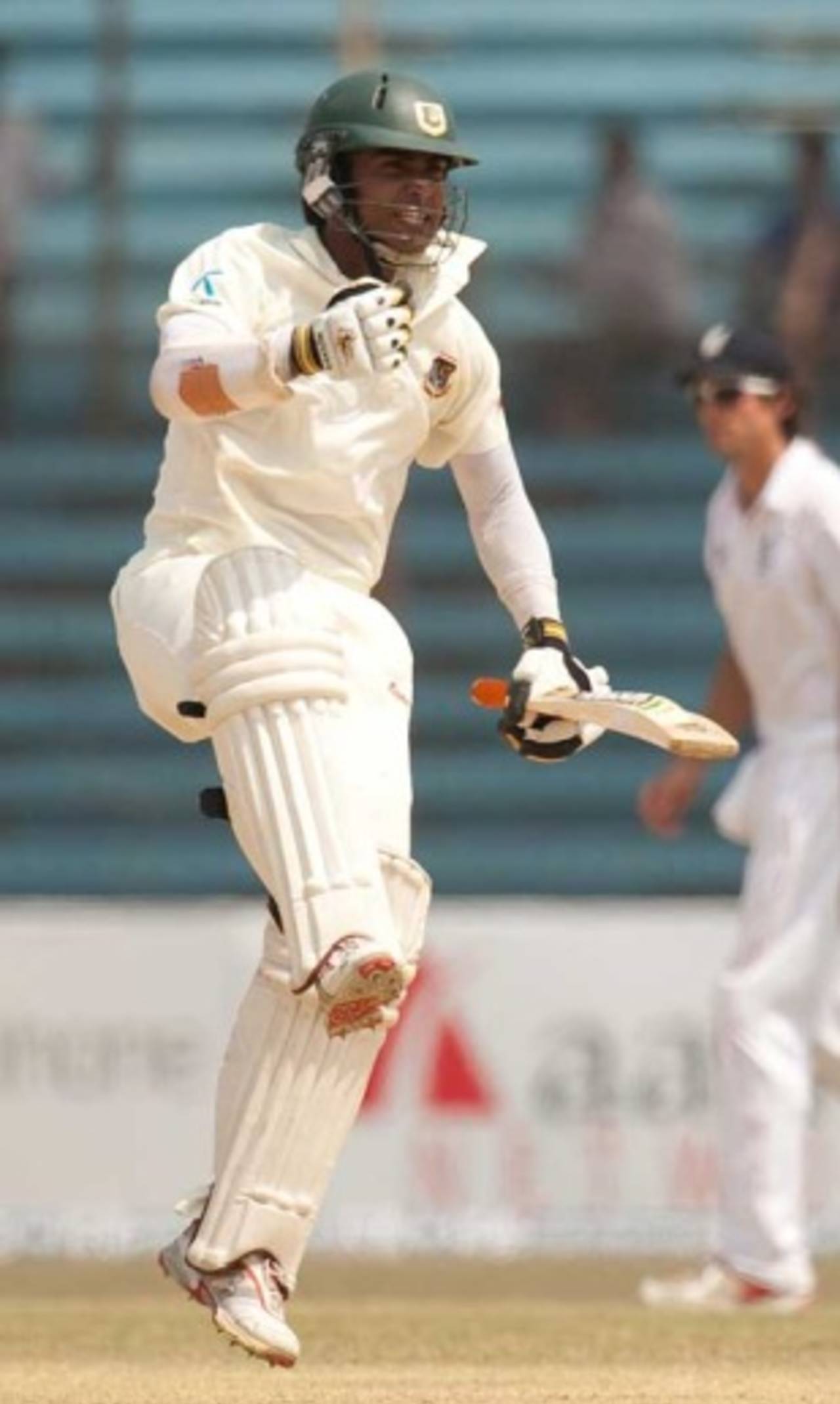Blushes were spared and honour was preserved on all fronts on the final day at Chittagong. The favourites emerged victorious by a sufficiently hefty margin (181 runs) to ensure against an inquisition, but the underdogs showed enough pride and fight to keep the contest bubbling well into the post-lunch session. Given the hideous one-sidedness of the opening two days of the contest, the subsequent cut-and-thrust augured well for Saturday's series decider in Dhaka.
"It's a really good win, and to get 20 wickets on that pitch was a fantastic effort," said England's captain, Alastair Cook, whose first Test in charge finished on an upbeat note. "It was a long, hard five days but to win like that was excellent. Everyone has contributed well, and I couldn't ask for any more than that. Test cricket is supposed to be hard, and it was hard graft at the end to get those last 10 wickets."
After a flying start to the contest on days one and two, in which England racked up a hefty first-innings 599 for 6 declared before reducing their opponents to 51 for 3 in reply, the fight and spirit that Bangladesh showed in adversity was hugely encouraging for their captain, Shakib Al Hasan. He defended his decision to bowl first on winning the toss, especially having witnessed Graeme Swann churn through 49 overs in the final innings.
"After what we saw today I am not disappointed with the decision," he said. "If I'd seen the ball being unplayable on the fifth day, maybe I would have been frustrated, but except for our first-innings bowling, everything happened as we thought it would. In the first innings we couldn't bowl in the right areas to create pressure, but we managed to improve that in the second innings."
The stars of the final stages of the contest were Bangladesh's sixth-wicket pairing of Junaid Siddique and Mushfiqur Rahim, who batted without being separated for two entire sessions and two balls shy of 70 overs all told, before the Man of the Match Swann nailed both in quick succession in the first half-hour after lunch.
For Shakib, however, the identity of Bangladesh's successes in this contest was less important than the quantity, and having watched Mushfiqur, Mahmudullah and Tamim Iqbal play with poise in the first innings as well, he was happy to be able to say that his team's consistency had gone up another notch.
"We fought hard in the second innings, as well as the first," said Shakib. "Previously we'd see only one batsman was performing. Now we get more than one batsman scoring runs, which is a positive thing for us. On the first morning, Jamie [Siddons, the coach] told us in a meeting that our batsman should each concentrate on making a hundred, because we now believe we can do it.
"I also believed that if we could survive for the first hour of the day, something good was possible," said Shakib. "When they batted very well up to lunch I was telling Mushfiq he [and Junaid] needed to work for another 40 minutes to get through their next period. They could not do it, but they still batted very well, and it shows how we have improved our character."
Of course, Bangladesh's struggles might have been a little more acute had England decided to go into the match with five bowlers. But Cook's instinct was to beat his opponents through scoreboard pressure as much as on-field pressure, and as he admitted afterwards, his only real dilemma on the eve of the game was whether to go in with three seamers or two spinners. Despite a few alarms along the way, he felt his chosen strategy was the right one.
"It was a very tough call before the game," he said. "That call gave me a sleepless night and a proper insight into the captaincy. Five bowlers is always a luxury, and when a partnership is building, your mind does wander, but Swanny got ten and the other bowlers bowled well, so it was the right decision. We've won a game comfortably after a lot of hard work."
Cook had less qualms about his other big decision of the match, however, the non-enforcement of the follow-on, despite securing a first-innings lead of 303. "Those conditions on the third day were hot and humid and we'd bowled 90 overs, so our lads needed a rest," he said.
"It's amazing what two sessions off does for a bowler, and even if we hadn't won the game, I'd have still backed my decision. You do talk to the bowlers a little bit, and if they are 100% 'you've got to enforce the follow-on' then you listen. But I'm not a massive fan of it. I was pretty set in my ways that we weren't going to enforce."
For Cook, of course, it was an all-important first victory as England captain, and as things panned out it proved to be a sound test of character. "I was quite pleased how calm I kept in that heat," he said. "Last night was probably the worst time for me, towards the end of that session when we'd been in the field all day. But we kept calm because we knew they couldn't keep doing what they were doing. We just had to keep believing it would happen and thankfully it did."
"They came back strongly and showed their character," said Shakib. "They are really professional and they kept bowling in the good areas that create the pressure. But I think after our first-innings bowling we have showed better character. We bowled in the right areas and our batsmen tried to leave the ball when it was in the danger zone. We are still improving, but we are a much more disciplined side than we were."
Andrew Miller is UK editor of Cricinfo. Go to http://twitter.com/miller_cricket to follow him on Twitter through the England tour of Bangladesh.
